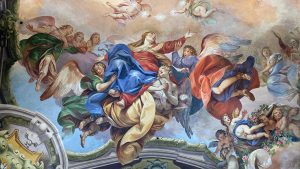
Homily from Father Chas Canoy,
Watch the Homily:
Listen to the Homily
The Ascension of Jesus and the Assumption of Mary, One is the Ascension, and the other is the Assumption! Why are they different? It’s because of who is doing the action. Jesus ascends into heaven, and Mary is assumed into heaven
Read the Homily
Father Chas Canoy: All right, so one of the things that I love about our Saint John Church and the stained glass windows is the subject of the South transept window and the North transept window, the main central stained glass. And I know the people in the back can’t see it, but maybe after Mass you can come and take a look. Because what is the subject of this?
Father Chas Canoy: South transept window, for those that can see it—the Ascension of Jesus Christ. Right. What’s the subject of the North transept? The Assumption of Mary. So what do they hold in common? They’re where they’re gonna go, right? Their destination. Where are they both going? Heaven. And both of them are entering body and soul into heaven.
Father Chas Canoy: Right—not just their souls, but both Jesus and Mary take both body and soul into heaven. Should any of us die before the second coming of Jesus—that’s probably going to be all of us, but we never know, right—do we bring our bodies to heaven? No.
Father Chas Canoy: Obviously not, because they are in the grave rotting away, right? But as Philippians 3 reminds us, our citizenship is in heaven. And from it, we also await the Savior, the Lord Jesus Christ. He will change our lowly bodies to conform with his glorified body.
Father Chas Canoy: But that’s not going to be until the end of time when our bodies will be transformed. Until the last day, we believe in the resurrection of the body and life everlasting. But today, we celebrate the singular post-resurrection exception to this rule. At the end of the earthly life of the Blessed Virgin Mary, Mary was assumed into heaven, soul and body. Okay?
Father Chas Canoy: So her earthly body was transformed immediately, conformed to that transfigured body of Jesus Christ upon her entrance into heaven. And so that is the divine mystery that we celebrate today in the Assumption of Mary, body and soul into heaven. Right? She is our placeholder, if you will, for humanity. But notice another difference between the subject of these two windows, and that is the names of the mysteries. One is the Ascension and the other is the Assumption. Why are they different? Well, it’s because of who is doing the action. Right—Jesus ascends into heaven, and what about Mary? She’s assumed into heaven. One is in the active voice over here, and one is in the passive voice.
Father Chas Canoy: In an active sentence, the subject is the one that performs the action. And so Jesus himself, in a joint action with God the Father, by his own power as God the Son, ascends into heaven. But can a mere creature do the same? No. Can a human being, even if she was the highest exemplar of our race, ascend into heaven by her own power? No. No.
Father Chas Canoy: And so that is why today’s mystery is expressed in a passive sentence, right? Mary is assumed into heaven. If Mary is receiving the action, who is performing the action? God—the Triune God: her Father, her Son, and her spouse, the Holy Spirit. And so it is with us. We too, God willing, will be assumed into heaven. And that is accomplished by God’s power.
Father Chas Canoy: We don’t have the power to force ourselves into God’s house. It’s him extending the invitation, and we accept that invitation by cooperating with God’s will in our life. Salvation is God’s action, but we actively cooperate with that action because God respects the human freedom with which he has endowed us. And so it is with every divine action of grace in our lives, the sacraments being the preeminent of those divine actions.
Father Chas Canoy: That’s why we say that we receive the sacraments. We receive the Eucharist. We receive the sacrament of reconciliation. Father Randy and I received holy orders. Becca Robert and Zach Johnson received the sacrament of matrimony last weekend. God is the one performing the action of divine life.
Father Chas Canoy: …being bestowed upon us in the sacraments. But we must actively cooperate with that action in order for it to be effective. We can render the power, the divine power of the sacraments, ineffective by our rejection of them or simply our lack of belief or faith in them.